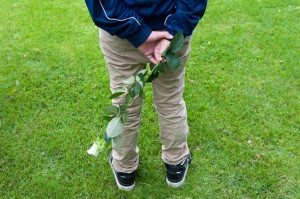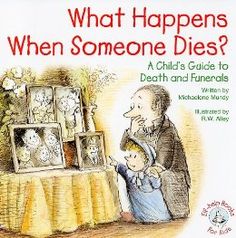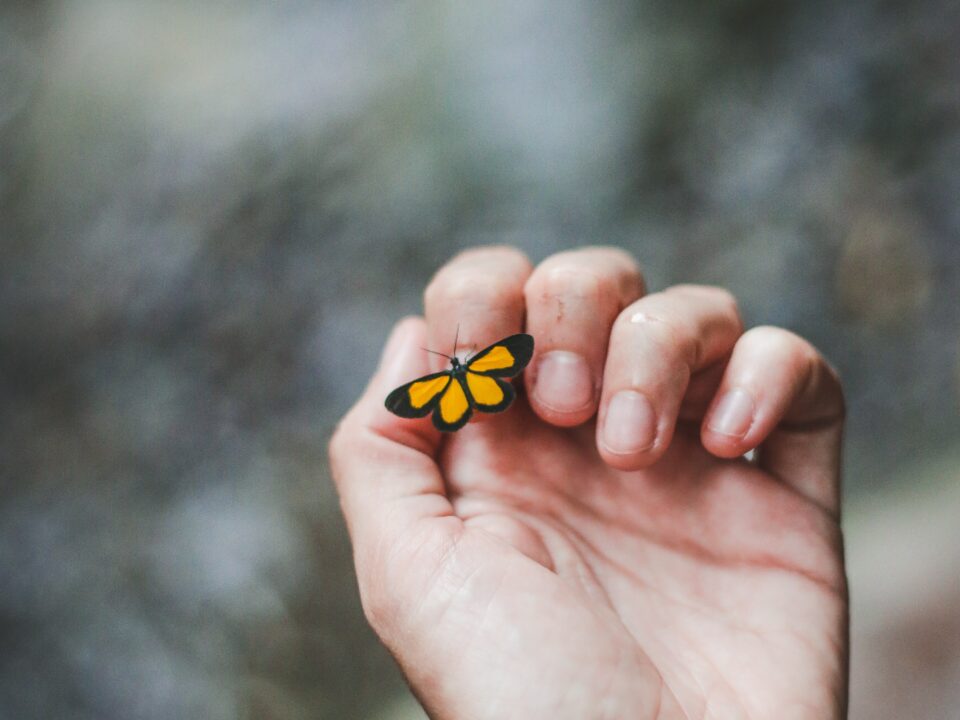What to Tell Children About Funerals
I was recently browsing through the new gift shop at Mission San Juan Capistrano, admiring the jewelry and slowly making my way to my favorite corner of the store; the book section on Grief. I’m always finding new and intriguing titles there and this time, I stumbled upon a series of children’s books on grief that deeply impressed me.
We hear the debate about children being at funerals pretty often around here and while we always encourage people to bring their children, they don’t always agree with us. Well, to my surprise, in the book What Happens When Someone Dies? the question is never even addressed, it is just automatically assumed that children will be there and explains with a delicate, gentle and uncomplicated voice what the child will experience.
Let me give you an example:
Under the question, What should I Say or Do at the Funeral Home? the author writes,
“At the funeral home, people talk about what they remember about the person who died. They talk about nice and sometimes funny times they had with the person. You may hear laughter as they remember happy times.
If you walk up to the casket, take your mom or dad’s hand. We all need each other – especially in sad times. Sometimes the casket is up too high for you to see. Ask someone to help you up.”
I don’t know about you but reading that made me feel better. The explanations are simple but address the hard stuff and don’t shy away from it.
I remember being told when it comes to children to only answer the questions they ask you. You don’t explain the complexities of life and death to your 5 year old when they’ve only asked you why you’re sad. Your answer may lead to more questions and that’s ok, but sometimes children can feel overwhelmed by information that they can’t process or understand. This book is an excellent resource. If you don’t want to read the whole book to them you can still reference this book to help you answer their questions in your own way.
What Happens When Someone Dies? addresses some tough questions like:
- Why do people die?
- Does it hurt to die?
- Are there other ways people say goodbye? (an explanation of cremation)
- What happens at the funeral home?
- What should I say or do at the funeral home?
- Why are some people at the funeral home happy and laughing?
- What should I do at the church funeral service?
- What happens at the cemetery?
- When will everything be ok again?
*These books do have a religious overtones referencing Heaven, God and prayer. I don’t feel they are heavy-hitting but these books may not be appropriate in their entirety for particular faiths.
I continue to be surprised by families who disagree with our funeral arrangers who see day-in and day-out the power of ceremony and how children react and benefit. Our arrangers are experts who can testify endlessly to the power of being included and present at a funeral; but too often a family’s fears and sense of protection keep children from experiencing a ceremony that would actually bring them even greater peace.
 A recent article entitled, “Should Children Attend Funerals?” states that despite public opinion, “child bereavement experts are united in believing that children should be offered the chance to attend funerals, regardless of how young they are.” The article goes on to quote one of these experts, Helen McKinnon, who says, “I’ve never yet come across anyone who regrets going to a funeral as a child. But what we do hear time and time again is those who wish they had gone and in many of those cases, it’s prevented them from starting on their grieving journey.”
A recent article entitled, “Should Children Attend Funerals?” states that despite public opinion, “child bereavement experts are united in believing that children should be offered the chance to attend funerals, regardless of how young they are.” The article goes on to quote one of these experts, Helen McKinnon, who says, “I’ve never yet come across anyone who regrets going to a funeral as a child. But what we do hear time and time again is those who wish they had gone and in many of those cases, it’s prevented them from starting on their grieving journey.”
This same article quotes Christina Brady who had to attend school the same day as her mother’s funeral. She asks the powerful question: “… if adults need a ritual to mark the passing of someone dear to them, doesn’t it follow that children – who are less able than anyone to make sense of the mess of feelings that follow a death – need it even more?”
The answer seems simple: Yes, they do.
There are two messages – this book offers one of understanding, acceptance, and compassion. The other only perpetuates the great fear and avoidance of death our culture has adopted. Let’s give our children the right message.
|| what do you think?
– Where do you stand in this debate and why?
– What answers were you given as a child when you asked about death and how did they help or hinder your understanding?
Other books on tough subjects available in this thoughtful series are:





42 Comments
Molly,
Wow great blog. I love the topic because you are right people and parents don’t know exactly how to handle a death or a service when children are involved. It is a topic and question that come up a lot in our industry. I think these books on grief will help us all understand how to explain these difficult situations to young children. Thank you for writing on such an important topic.
Shayna
Thank you so much Shayna! I know you see first-hand some of these conversations and debates. I’m glad you found them useful and I hope you can continue to spread the word & help families make healthy decisions for their children!
Molly
Molly,
My young daughters, along with many other great-grandchildren, were at the bedside when their great-grandfather died. There was the reality of the dying and then the death, but my daughters were happy that they were there. As adults, they appreciate being a part of that chapter in our family’s life. As my daughter Alexis shared with me years ago, she would’ve felt “cheated” out of the opportunity to be enjoined with everyone if I would have kept her apart from the family. She would have felt as if she wasn’t “connected” with everyone else touched by the event. Now, years later, her memories are strong, although somewhat embellished, and she doesn’t fear death at all.
Chris,
What a perfect testimony to the idea that these child bereavement experts have never encountered anyone who would say that they wish they hadn’t been present – everyone who has had the privilege of witnessing a death or a funeral ceremony is better and healthier for it.
Thank you so much for sharing your family’s experience, that is so powerful.
Molly
great discussion Molly. This question comes up constantly when a child suffered a death of a loved one. This is always a tough question to answer or approach. On one hand, we know what is the right thing to do and on the other I never want to step on the toes of the parents when it comes to advice for their children. Most of the time I try and keep a neutral approach and be more informative than recommending advice.
Excellent point, Elsa. I think you’re approach is so wise – we aren’t here to bully a family into doing something they are against, but if we can provide facts for them to make educated decisions off of, then we have done our job. I love how thoughtful your approach is – thank you so much for sharing!
Molly
Molly,
I could not agree more that no matter what age you need to experience the process. When both my mother’s died in 1989 and 1991, I was at the arrangements and both funeral’s with my mother. When my father’s parents died in 1993 and 1995 again I was involved in the process. When my mother-in-law died in 2001, my daughter’s were 3 and 4 years old. They were with her while she was sick and dying. They went through the process of being at the service and burial. I’m not sure they completely understood but they still remember now certain things about that day.
When my dad died just 3 months ago again my daughters now 16 and 17 and myself took care of my dad until his last breath. They helped with the arrangements and service. I feel it is very important to include children regardless of the age. They need to grieve just like adults. It might be in a different way. By sheltering them from it your not helping them to understand. Your robing them of this time that will never come again.
This is such great helpful information that we have as a resource to offer families and friends that have a death. Thanks for sharing.
Amy
Amy,
Wow. You’ve lived it – you’ve seen the power and can testify to the treasure these experiences were for both you and your daughters.
Your point is superb, children need to be given the same opportunity to grieve as adults are given. Yes, it will be a different experience for them and they may not understand all that they are seeing, but you know what? I have a suspicion that many adults don’t understand what they’re seeing and also have difficulty processing what’s going on – I don’t think that’s limited to kids. And if we give children these opportunities as they come along the better equipped they will be in life – it’s just true.
Thank you so much for sharing your excellent insight on this subject, it’s so appreciated!
Molly
Molly,
I know this one first hand. When I was five, my paternal grandfather died. He was fun and funny with all of us. He died suddenly of a heart attack. I went to a neighbor’s home while everyone else in the family, including my two oldest sisters went to the “funeral”, which remained a mysterious event. I went the following day to the cemetery where the grave was covered with flowers. I remember, they were laid out in a perfect rectangle. I stood there trying to figure out how they got grandpa down there, what was the box like, how did he look. I remember feeling left out and puzzled.
Fast forward thirty-seven years. My father brings a manilla folder to our house one evening with a photo he had discovered and wanted me to see. By this time I had been in funeral service for 16 years. I had embalmed and prepared more than 600 people entrusted to my care and I knew as well as anyone can, the answers to all of those questions my five year old mind could conjure, or so I thought. As I opened the folder I was suddenly transported back to those same questions that began standing at my grandfather’s grave. There was a black and white photo of Grandpa Turner in his casket. “So that’s how he looked! And that is the box he is in.” As surprising as the seeing the photograph was, I was even more unprepared for the deep latent need that was unexpectedly satisfied. Like a deep sigh of relief that I wasn’t even conscious I needed.
My parents made a decision either with advice or out of their own concern and personal anxieties about death. They did what they thought they should based upon what they knew at the time. It simply wasn’t the best thing they could have done. Fortunately for me, I suffered no ill affects that hindered me in any way that I know of. But that sigh of relief told me that there was more to my need than I would have thought.
Thanks for writing this one.
Jeff
Jeff,
What a story. THAT is a testament to how being left out actually makes these children FEEL left out. That feeling affected your grief and while you didn’t suffer trauma from the lack of the experience, your grief wasn’t satiated, completed or at rest until you had those questions and concerns at last answered. That is just incredible.
As I read your story I thought of the children denied from going to a parent’s funeral or a sibling’s. A grandparent is such a significant relationship but generally not as life-debilitating as these closer family losses and yet people continue to deny children these experiences that unfortunately, only lead to further debilitation.
I LOVE your story – it’s beautiful and profound. I’m so, so glad you found that sigh.
Molly